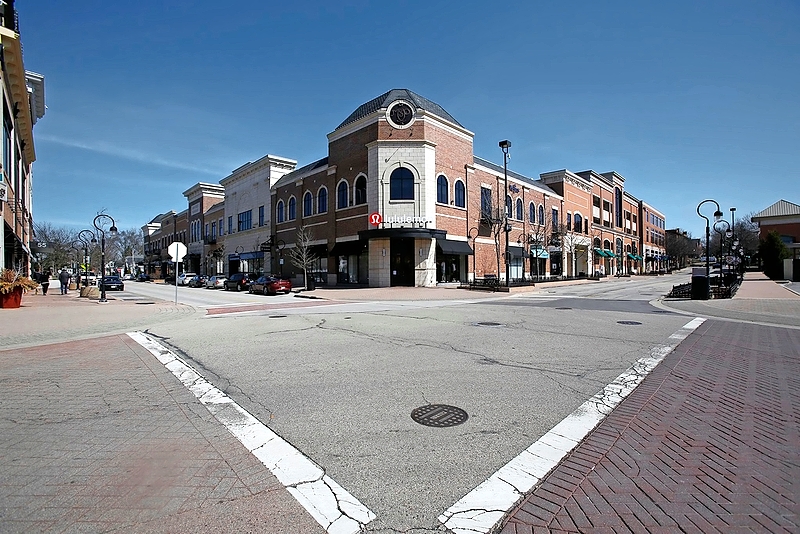Suburban ShutDown
By Naperville Magazine
May 2020 View more 630

For businesses worldwide, the story of the coronavirus eventually may be told in dollars and cents, in losses from days upon days with closed doors, in revised business models reflecting changed consumer habits.
When Naperville business owners talk about the pandemic, though, their words speak of caring—empathy for their employees, for each other, and for their customers.
By and large, businesses closed at 5 p.m. March 21, when Governor J.B. Pritzker’s stay-at-home order first took effect throughout Illinois. Many owners had been following the news about the virus and the measures other nations were taking to slow its spread, and already had been planning how to protect their employees and the public.
“We knew we were going to shut down (in Illinois) once New York did it,” said Becky Anderson, owner of Anderson’s Bookshop and Anderson’s Toyshop in downtown Naperville as well as bookstores in Downers Grove and LaGrange. “This has affected everyone at levels I didn’t even think were possible.”
Anderson began tracking coronavirus news in February and encouraged employees to stay home if they had health conditions that put them at greater risk for the worst of COVID-19. The company also promised employees the pandemic wouldn’t steal their sick days or vacation time, she said.
As much as possible, the staff at Anderson’s practiced social distancing from coworkers and from customers—a challenge in a business built on one-on-one service.
In contrast, Tara Wofford’s Pure Art hair salon is a one-woman operation. She has one client chair and space for her next customer to wait. Even as the state was issuing guidelines against large gatherings, she hoped the size of her business meant she’d be able to keep working.
When Pritzker announced the shutdown, Wofford raced to reschedule more than two weeks of clients into appointments after the original projected end date for the restrictions.
“I did work until 4:30 [p.m.] on the Saturday [the shutdown took effect]. I only let in one person at a time and I wiped everything down with Lysol in between each client,” she said. “The whole thing just gives me anxiety. I don’t know where to start moving people as this is extended.”
Wofford, like many in service industries, doesn’t earn an income if she doesn’t work. But her landlord, Phenix Salon Suites, eased the strain by waiving rent temporarily, she said.
“I feel fortunate they’re so supportive,” she said. “I do know my business is going to survive. I’m going to be very, very busy when we come back.”
Some businesses, though, felt the economic pressure almost immediately. In the first week of the shutdown, at least two businesses on Ogden Avenue had closed permanently. More are likely to follow, Anderson said, and it’s something every business owner fears, even when they’re well established in the community.
“We’re worried about our employees. We’re worried about the lease we have at one location,” she said. “We’re concerned about … how many months this will last, about what we owe to our publisher partners.”
Anderson’s put a number of employees, mostly part-time staff, on furlough during the closure, with the plan to call everyone back to reopen within days after the lifting of restrictions.
During the shutdown, Anderson’s has tried to offset the loss of in-store sales by offering customers curbside pickup and a reduced shipping fee for online orders. The business’s internet sales increased 20-fold, Anderson said.
The store’s staff also generated ideas for new offerings and ways to connect with shoppers. To help families pass the long days of social distancing, Anderson’s created Boredom Buster Boxes full of surprises for parents and kids to enjoy together. And to help readers choose their next books without being able to peruse the shelves, Anderson’s staff launched Facebook Live discussions of new releases.
Still, business owners say such measures are no replacement for the face-to-face contact they usually enjoy with their customers.
“I just hope that people think about community, supporting businesses in the community. Think about buying gift cards that you may use later but can support a business now when they need it,” Anderson said. “If we all do what we can, we’ll make it through this.”
BUSINESS TO BUSINESS
When stores and restaurants still were open, businesses were scrambling to find cleaning supplies. Anderson’s Bookshop owner Becky Anderson happened on a supplier with hand sanitizer in stock. She placed a huge order and shared it with downtown Naperville businesses. “That’s the kind of thing we do for each other,” she said. Anderson, who formerly served on the Naperville City Council and the Downtown Naperville Alliance board, says such community support is essential for surviving the shutdown. Key will be businesses and landlords negotiating temporary rent terms so both can stay afloat, she said.
Photo by Mike Mantucca/Naperville Sun


